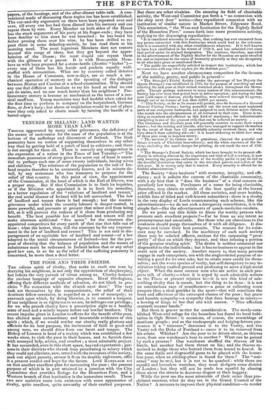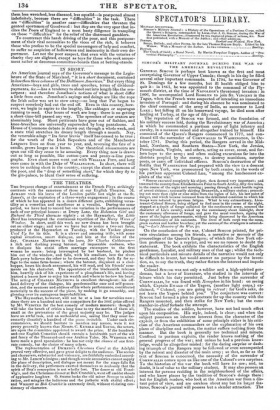THE POOR AND THEIR FRIENDS.
THE odious spirit of rivalry, that seeks to exalt one man by decrying his neighbour, is not only the opprobrium of shopkeeping, but infects the very pursuit of virtue among us. Charity borrows the envious language of opposite chapmen. Rival theologians, offering their different methods of salvation, do not blush to pro- claim " No connexion with the church next door." The very task set themselves by the compassionate, the relief of their destitute fellow-creatures, is regarded as a sort of monopoly; to encroach upon which, by doing likewise, is to commit a trespass. If our neighbour is as righteous as we are, he infringes our privilege ; for we who preach charity have a prescriptive right to a healthy state of soul and a saintly repute before our lowlier brethren. The recent impulse given in London to efforts for the benefit of the poor, has elicited most extraordinary and lamentable evidences of this spirit ; which, if we would render our charity really glorious and efficient for its best purpose, the incitement of faith in good-will among men, we should drive from our heart and tongue. The Bishop of LONDON is head of a society which was established a few weeks since, to visit the poor in their homes, and to furnish then, with moneyed help, advice, and comfort ; a most admirable project. ft has succeeded, even in this short space, beyond expectation ; per- sons in their districts who shrank from penetrating to misery which they could not alleviate, now, armed with the resources of the society, seek out abject poverty, arouse it from its deathly nightmare, offer it a present cordial and hope for the future. Lord RANELAGH set on foot another excellent plan for succouring the poor ; the present purpose of which is in part attained by a junction with the City Committee that provides Refuge for the Houseless Poor, and a Western branch of that institution is the immediate result. These two new societies came into existence with some appearance of rivalry, quite needless, quite unworthy of their exalted purposes.
But there are other rivalries. On entering its field of charitable activity, the West-end Committee put forth a " no connexion with the shop next door" notice—they repudiated connexion with an institution of similar nature in Market Street, Edgeware Road. This association, " the West-end Institution for the Nightly Relief of the Houseless Poor," comes forth into more prominent activity, replying to the disparaging repudiation-
" It is considered necessary to observe, that nothing has ever emanated from any person connected with this Institution which could lead to the inference that it is connected with any other establishment whatever. It ii well known to have been established in the winter of 1838-9, and Las subsisted ever since that period under its original designation. The cautions, therefore, appended in the advertisement of the Nightly Shelter for the Houseless are quite uncalled for, and as injurious to the cause of humanity generally as they are derogatory to all who have given or sanctioned them. " The public are respectfully solicited to inspect this institution; which has no connexion with any other asylum for the destitute poor."
Next we have another eleemosynary competitor for the favours of the nobility, gentry, and public in general-
" The Stranger's Friend Society (under the patronage of her Majesty the Queen Dowager) was established in 1785, for the purpose of searching out and relieving the sick poor at their retired wretched abodes throughout the Metro- polis. Though perhaps unknown to many readers of this announcement, the Society has ever since that period been in active operation ; and during the last year 7,456 cases of distress, chiefly families, were relieved through its agency, though out of an income of less than 3,000/. per annum.
"'This Society, so far as its means will permit, does the business of a General District Visiting Society ; having parcelled out the worst and most neglected parts of our overgrown metropolis, and assigned to each division active visiters, who search into the circumstances of all intrusted to their care. There is no- thing so excellent and efficient as this kind of machinery ; for indiscriminate almsgiving is one of the greatest evils that can be inflicted on society The clamorous and dissolute poor will generally contrive to make their wants known ; hut the retiring and bumble, who have managed to support themselves by the sweat of their face till unavoidable calamity overtook them, and who have shrunk from soliciting aid—oh! it is heart-sickening to think how many of these pine away in hopeless misery.
The services c,f its visiters are all gratuitous, (beyond the peaceful and future rewards of Christian benevolence); and the whole expenses of the So- ciety, excluding the usual charges for printing, do not reach the sum of 150/. a year.
"The Stranger's Friend Society, which has been brought to its present effi- ciency in relieving distress by the experience and trial of half a century, is now only awaiting the generous enthusiasm of the wealthy public to put an end to the dreadful destitution that exists in the wretched garrets and cellars of the sick poor. It is money only that is wanted. Every security is offered for its faithful administration."
The Society "does business" with economy, integrity, and effi- ciency; and it solicits the custom of the charitable community, with a sly hint that it "does the business" of a rival concern on peculiarly low terms. Purchasers of a name for being charitable, therefore, may obtain an article of the best quality at the lowest price offered in the market. All these societies, and more besides, exhibit lists of titled and well-known subscribers: there is a rivalry in the very display of Lords countenancing each scheme, like the advertisements—we do not seek a derogatory resemblance, it is the simple fact—like the advertisements of quack-medicine-venders.
Do we point out this foible to blame the worthy persons who promote such excellent projects ?—Far be from us any intent so presumptuous and unsuitable. But those who are obnoxious to the weakness should purge themselves of it with all diligence. It dis- figures and taints their best pursuits. The reasons for its exist- ence may be surmised. In the machinery of each such society there may be salaried officers, anxious for the surpassing " pros- perity " of that on which they depend, and thus infusing a portion of the genuine trading spirit. The desire is neither unnatural nor disgraceful to the individuals ; but it has no business to appear in the overt acts of the society. Another reason is, that many persons engage in such enterprises, not with the singlerninded purpose of at- taining a good for its own sake, but to attain some credit for them- selves; not the worst species of vanity, but still derogatory to any in- stitution taking exalted ground and professing to serve a high social object. When the most earnest men who are active in such pro- jects talk of charity—when it is urged by such admirable writers as the Times at present rejoices in—it is not this kind of sub- scribing rivalry that is meant, but the thing to be done : it is not an ostentatious race of munificence--a game at collecting more paupers than a rival gambler in the sport—that will conciliate the trust and affections of the estranged classes of the poor ; but grave and humble sympathy—a sympathy that does homage to misery— a bowing of kings to her that sits with sorrow. " Nice affection scorneth meaner hands."
But there is graver matter for consideration. The newly-esta- blished West-end refuge for the houseless has found its local habi- tation in Ogle Street : it occasions, of course, the assemblage of destitute people ; and so the tradespeople and lodging-letters pro- nounce it a " nuisance," denounce it to the Vestry, and the Vestry ask the Duke of Portland to cause it to be removed from his estate. Whither? Are the poor to be driven about, as thieves were, from one watchman's beat to another ? What can be gained by such a process ? One watchman shuffled the thieves off his hands, but another had them thrust on his; and the thieves re- mained to dodge those who hunted them from bound to bound. Is the same futile and disgraceful game to be played with the house- less poor, when an abiding-place is found for them ? The "nui- sance" may be real, but it is not to be quashed : while there are squalid and houseless wretches, they must disfigure some district of London ; but they will not be made less squalid by chasing them about the streets in decorous disgust at their beggary.
While the poor see the most miserable of their order thus pro- claimed outcasts, what do they see in the Grand Council of the Nation ? A measure to improve their physical condition—to render them less wretched, less diseased, less squalid—is postponed almost indefinitely, because there are "difficulties" in the task. There are "difficulties" in another case—difficulties that threaten the genteel sportsmen of Goodwood : but they are the very spur that in- cites the Peers of England to a most hasty diligence in trampling on those " difficulties " for the relief of the distressed gamblers. To counteract this harsh driving of the poor, and this postpone- ment of their vital necessities to the vices of the rich, it behoves those who profess to be the special messengers of help and comfort, to suffer no suspicion of hollowness and insincerity in their own de- portment. Let not the poor suspect, that even with the votaries of charity they are slighted, except as toys for those who seek amuse- ment rather at decorous committee-boards than at betting-stands.



























 Previous page
Previous page